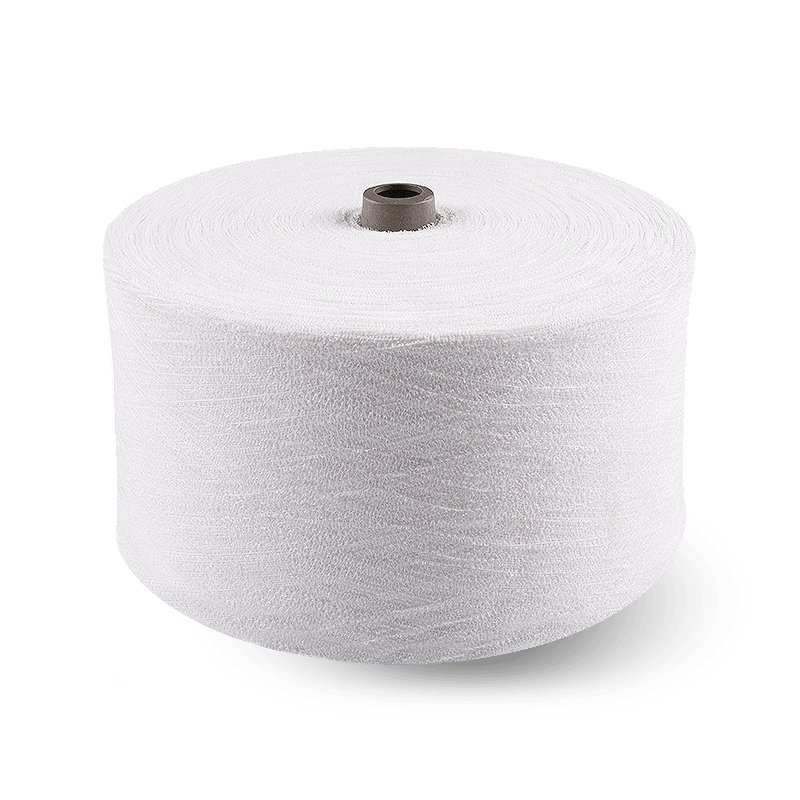Dyed polyester yarn is a type of yarn that is made by adding pigments or masterbatches directly to the fiber during the fiber manufacturing process, so that the fiber is evenly colored during the spinning stage. This process not only gives polyester fibers a lasting color, but also avoids the environmental pollution caused by traditional dyeing processes. Therefore, it is widely used in clothing, home textiles, industrial textiles and other fields. With the increasing awareness of environmental protection, colored polyester yarn is gradually becoming an important innovative technology in the textile industry.
The traditional dyeing process is to dye the fiber or fabric in water using chemical dyes after it is formed. This process not only consumes a lot of water resources, but also produces wastewater and other pollutants. Dyed polyester yarn uses a completely different manufacturing process:
During the manufacturing process of polyester fiber, masterbatches or pigments are directly added to the polyester melt, so that the pigment is evenly distributed in the polymer molecular chain. Through this process, the fiber is colored during the production process, avoiding the subsequent dyeing process.
The colored polyester melt is stretched into yarn through the spinning process. Since the pigment has been integrated into the interior of the polyester fiber, the finished yarn has excellent color stability and will not fade as easily as traditional dyeing.

This process not only simplifies the textile production process, but also improves production efficiency, making mass production possible. In addition, the traditional dyeing steps are eliminated, reducing production costs and environmental burden.
The biggest advantage of colored polyester yarn is its green and environmentally friendly characteristics. Traditional dyeing processes require a lot of water resources and produce seriously polluted wastewater. In contrast, colored yarns are colored once during the fiber manufacturing process, avoiding the water dyeing process and reducing the discharge of chemical wastewater.
Since the pigment has been integrated into the fiber, the color stability of colored polyester yarn is extremely high. It has excellent light resistance and washability, is not easy to fade, and can maintain bright colors for a long time. This feature makes it particularly good in outdoor and high-frequency use occasions (such as sportswear, carpets, etc.).
The production process of colored polyester yarn is more efficient by eliminating the post-dyeing step. This means that the factory can produce more finished products in the same production cycle. In addition, the simplified process also reduces energy consumption and production costs, making this yarn more competitive in the market.
By controlling the addition ratio of masterbatch, colored polyester yarn can achieve precise matching of various colors, and the color distribution is uniform and there is no color difference. It can meet a variety of different design requirements and is widely used in fashion, home and industrial fields.
Colored polyester yarn is widely used in sportswear, outdoor clothing and functional clothing. Due to its durable color and easy cleaning characteristics, this yarn has become an ideal choice for clothing that needs to be washed frequently and used outdoors for a long time. In addition, the fashion industry has also begun to use this yarn to make colorful fashions that are not easy to fade.
Colored polyester yarn is widely used in the field of home textiles, including curtains, carpets, sofa covers, etc. Its high color fastness and non-fading characteristics enable it to maintain a good appearance in a home environment with more sunlight. In addition, its environmentally friendly characteristics also cater to consumers' demand for green homes.
The industrial field has also shown great interest in colored polyester yarn, especially in areas that require wear resistance and weather resistance, such as automotive interiors, outdoor advertising fabrics, etc. The high strength and durability of this yarn, combined with the durability of its color, make it play an important role in these applications.
As the world pays more attention to sustainable development, the textile industry continues to pursue more environmentally friendly production methods. As an environmentally friendly option for waterless dyeing, colored polyester yarn will occupy a more important position in the future textile market. Researchers are working to further reduce energy consumption and carbon emissions in fiber production to achieve a greener textile supply chain.
With the advancement of technology, colored polyester yarn may be combined with smart fiber technology to develop yarns with special functions. For example, by adding special additives during the production process, the yarn can have antibacterial and UV protection functions, further expanding its application areas.
As consumers' demand for personalization increases, colored polyester yarn will also develop in the direction of personalized customization. By controlling the proportion of masterbatch in fiber production, manufacturers can produce yarns with unique colors and textures to meet the design needs of different customers.
As an environmentally friendly, durable and efficient textile raw material, colored polyester yarn is gradually emerging in the global textile market. Its wide application in clothing, home textiles and industrial fields demonstrates its great advantages in performance and environmental protection. With the continuous innovation of technology, colored polyester yarn will occupy a more important position in the textile industry in the future and become a key force in promoting green textiles.